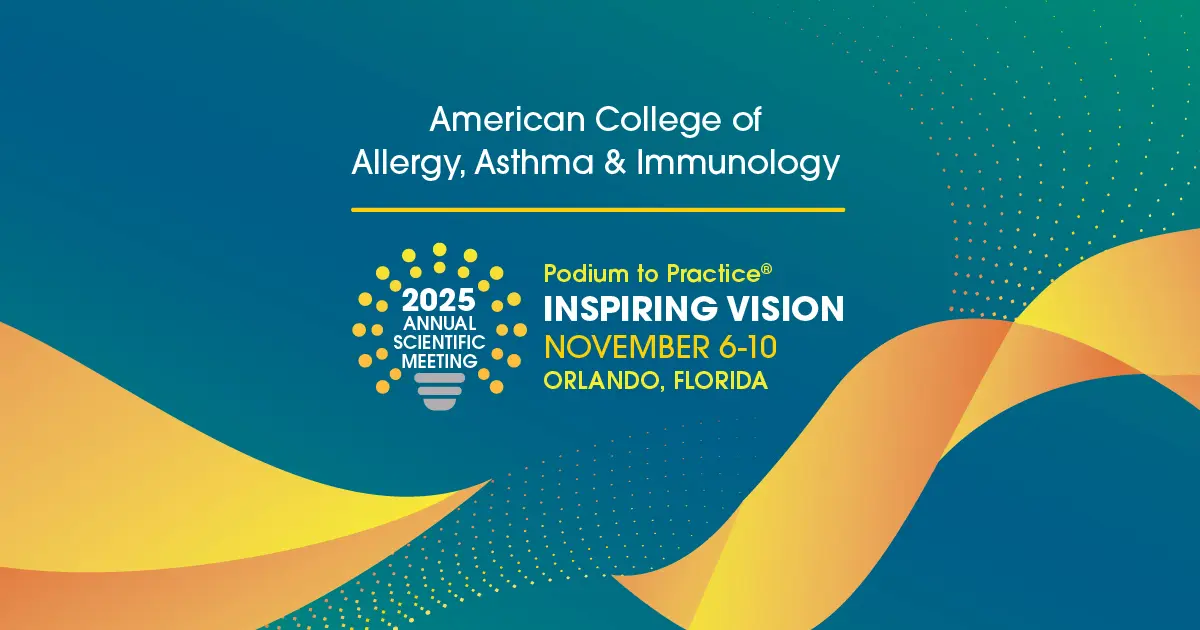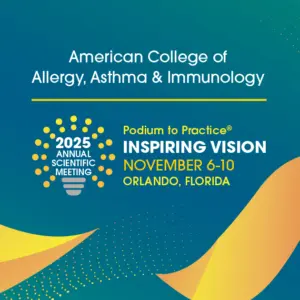November 6, 2025
New study highlights gaps in referrals during pregnancy
ORLANDO (Nov. 6, 2025) – Many pregnant women experience allergies, asthma, or reactions to medications — conditions that can affect both mother and baby if not carefully managed. Yet new research presented at the 2025 American College of Allergy, Asthma and Immunology (ACAAI) Annual Scientific Meeting suggests a reluctance among obstetricians to refer their pregnant patients to allergy specialists, even when a referral could help improve care.
The study surveyed obstetricians at a large academic medical center. It found that while nearly all the doctors cared for pregnant patients in both clinics and hospitals, about one in four never referred a patient to an allergist, and almost half referred only once a year.
Referrals most often happened for suspected drug allergies, followed by hives (urticaria) and asthma. Many of the obstetricians surveyed said they didn’t always know when to refer to a specialist, and others cited long wait times for appointments as a barrier. Most said they wanted clearer guidelines and more education about managing allergies in pregnancy.
“Pregnancy can change how a woman’s immune system reacts to allergies or asthma,” said Miriam Al-Saedy, MD, Internal Medicine resident, lead author of the study and ACAAI member. “An allergist can help confirm true allergies, guide safe medication use, and create a care plan that supports both maternal and fetal health.”
Says allergist Kelly Colas, DO, PhD, co-author of the study and ACAAI member, “If you’re pregnant and living with allergies, asthma, or a past allergic reaction to a drug, you should talk to your obstetrician about whether seeing an allergist might help.” Dr. Colas says an allergist can:
- Confirm or rule out medication allergies so you can safely take what you need during pregnancy.
- Help control asthma to keep both you and your baby breathing easier.
- Manage hives, eczema, or other allergic conditions safely with treatments appropriate for pregnancy.
- Work closely with your OB to coordinate your care before, during, and after delivery.
“Allergy and immunology care in pregnancy is safe and can make a real difference in how women feel,” said Dr. Al-Saedy. “Don’t hesitate to ask for a referral if you think you need one.”
Abstract Title: Barriers to Allergy and Immunology Referral in Pregnancy: A Survey of Obstetric Physicians (Full abstract below)
Presenter: Miriam Al-Saedy, MD
For more information about management of allergies and asthma during pregnancy, or to find an allergist in your area, visit AllergyandAsthmaRelief.org. The ACAAI Annual Scientific Meeting is Nov. 6-10. For more news and research from the ACAAI Scientific Meeting, go to our newsroom and follow the conversation on X/Twitter #ACAAI25.
About ACAAI
The American College of Allergy, Asthma & Immunology (ACAAI) is a professional medical organization of more than 6,000 allergists-immunologists and allied health professionals, headquartered in Arlington Heights, Ill. Founded in 1942, the College fosters a culture of collaboration and congeniality in which its members work together and with others toward the common goals of patient care, education, advocacy, and research. ACAAI allergists are board-certified physicians trained to diagnose allergies and asthma, administer immunotherapy, and provide patients with the best treatment outcomes. For more information and to find relief, visit AllergyandAsthmaRelief.org. Join us on Facebook, Pinterest, Instagram, Threads and X.
R310
BARRIERS TO ALLERGY AND IMMUNOLOGY REFERRAL IN PREGNANCY: A SURVEY OF OBSTETRIC PHYSICIANS
- Al-Saedy*, K. Colas, Seattle, WA.
Introduction: Allergic and immunologic conditions such as drug allergies, asthma, and urticaria are common during pregnancy and have implications for both maternal and fetal outcomes. Despite evidence supporting the safety and benefit of Allergy and Immunology (A/I) consultation in pregnancy, referrals remain limited. This study aimed to assess referral practices and barriers among obstetric physicians managing pregnant patients at a large academic center.
Methods: A 20-question cross-sectional survey was distributed to obstetric attending physicians, fellows, and residents. The survey assessed physician experience, comfort managing allergic conditions, referral frequency, perceived barriers to A/I consultation, and educational needs.
Results: Of the 27 respondents, 59.3% were attending physicians with over ten years of experience. While 92.6% practiced in both inpatient and outpatient settings, 23.1% never referred pregnant patients to A/I, and 42.3% referred only once per year. Referral reasons included drug allergy (83.3%), urticaria (38.9%), and asthma (33.3%). Only 51.8% reported feeling completely or mostly comfortable managing drug allergies. The most frequently reported barriers were limited knowledge about referral indications (55.6%) and long wait times for appointments (44.4%). Educational interventions requested included institutional guidelines (76%), provider resources (72%), and workshops (64%).
Conclusion: Obstetric physicians infrequently refer pregnant patients to A/I specialists due to limited knowledge and logistical barriers. These findings highlight an unmet need for quality improvement in institutional support, education, and streamlined referral pathways. Targeted educational interventions may improve physician confidence and patient access to allergy care in pregnancy.

